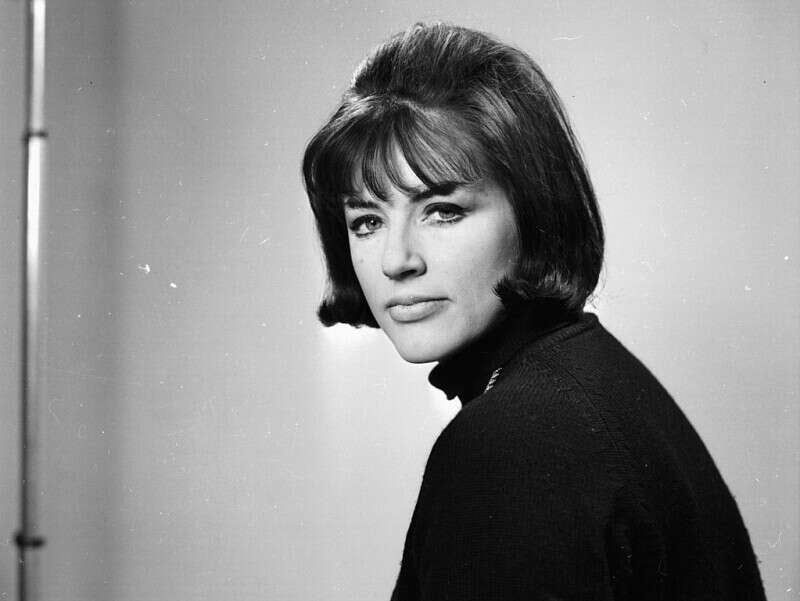
Viscount Rothermere has paid tribute to Dame Ann Leslie as “a brilliant journalist with the courage of a lion” after her death aged 82 on Sunday.
Leslie began her career at the Daily Express straight out of university. After starting in the Manchester office, she was quickly moved to London and given her own column, aged just 22.
She began as a showbiz reporter before moving on to foreign affairs and covered conflicts from El Salvador to the Falklands. She also covered presidential and UK elections, the fall of the Berlin wall and the famine in North Korea – winning nine Press Awards along the way.
Talking to Press Gazette in 2007, she said of her early days on the Express: “I got a job as a so-called trainee graduate reporter at the provincial office of the Daily Express in Manchester. It was an absolutely grisly time. I hated it so much. I didn’t know how to do stories, anyway. I had a terrible first news editor, Tom Campbell, who told me I was keeping a good man out of a job.
“I wanted to get the hell out of Manchester and when I was 22 I was given a column in Fleet Street. But I hated it. I thought: ‘What the hell do I know about anything?’ Now it’s normal, but then it was revolutionary. Everybody liked it, but I knew it was rubbish – although, looking back, maybe no more rubbish than anyone else’s.
“Fleet Street had dimly become aware that half of the human race were women, but in Manchester it was completely macho. [Campbell] did everything he could to drive me out. Funnily enough, if he hadn’t been so keen to get rid of me straight off, I wouldn’t have hung on, but it so enraged me that his treatment of me was on the grounds of my gender, a certain kind of iron entered into my soul.
“I wasn’t particularly feminist because modern feminism hadn’t got going then, but it made me determined that I would leave on my own terms.”
From 1967 onwards Leslie was on a freelance contract with the Daily Mail. She said was determined to never again be a “taxi on a rank”.

Talking about her time covering foreign politics, she said: “I’ve known several war junkies, six of whom were good friends and have been killed. I’m not a hardware person – I couldn’t tell a T74 from a T55 and don’t care. I’m just interested in the politics and, of course, politics is about human stories.
“I think the covering of war has changed since more women have gone into it. Although I rather resist the idea that there is a feminine way of covering stories, I think when it comes to war there is. Men have much more of a Top Gear Clarkson-like concern with hardware. Women are more interested in the human stories.
“Some of the older foreign correspondents, some of them deceased, said to me they hated the feminisation of war coverage. One old crusty gent said to me: ‘You women feminised all the news.”
“There weren’t many women working as foreign correspondents when I started, but now they’re 10 a penny.”
She said that she often saw it as her job to interest Daily Mail readers in a foreign story they might otherwise overlook.
“What I really like is starting off on a job that you know perfectly well your readers don’t want to know about. The challenge is to get them to start reading and thinking: ‘I’ll go on reading it.’
“You know from the reactions you get that they had never heard of this place before, but they think: ‘Wow, that was terrific’. It’s partly aspirational – they want to read a paper that credits them with enough nous to want to know and hear about something that might be outside of their immediate comfort zone.”
Daily Mail editor-in-chief Paul Dacre said: “A smasher of glass ceilings, she was a groundbreaking figure in the craft of journalism.”
Leslie is reckoned to have reported from 70 countries for the Mail between 1967 and 2012. She was said to have rated this report from 1990 of Nelson Mandela’s release from prison as among her best work.
One of the things that distinguished Ann Leslie from the common herd of journalists of our age was just exactly that, writes Julia Langden. She was never a member of any herd.
It meant that on any story where Fleet Street’s finest were to be found in massed expectation, all carefully keeping the competition under scrutiny, Ann would always be somewhere else.
She didn’t worry about what the others were up to. She wasn’t anxious about missing the story that everybody else was writing. She went out and found the story for herself and she would beat the opposition every which way.
She’d be in the taxi with the key player when the herd was still trying to hire cars. She was resourceful and fast-thinking and, most importantly, she was also fearless, so she didn’t need the safety of the herd. She might turn up at the presidential press conference, but only because she had already nabbed the president’s main minion earlier, filed the story – and also fixed with the fixer to be called for a question, just to give her piece a newsy nose.
She could talk her way out of trouble and into anything. She had the tradecraft of the trained spy and could pass herself off as anybody. She was quick and clever and she had that rat-like cunning which Nick Tomalin so memorably defined as one of the three primary requisites of a competent journalist.
So mostly she’d be off on her own, dressed up to the nines if that was going to get her past the goons on the gate, or dressed down to the dowdy if today’s game was going to be avoiding unwanted attention Not that Ann ever did dowdy, of course. She could put on a headscarf and leave off the lipstick, but she still looked a million dollars as soon as she flashed those eyes.
She didn’t often remove her nail varnish. But did it matter? I saw her entrance starving children at a Mother Teresa’s hospice by making her scarlet fingernails dance for their delight. It seems incongruous, an affront even – and yet it brought smiles, a moment of happiness. And I have never known anyone who could type as fast as she could with nails as long as hers.
Her skill as a reporter – and it was being a reporter that mattered to her – was that she related whatever it was that she was writing about to the commonplace. She could explain a war or a riot or a revolution by telling her readers what it meant to the person on the street in Moscow or Manila or Maputo. So she got out there, found a translator, got on to the streets of wherever she was and talked to the men and women – particularly the women – who could help her put the human perspective into her reporting.
She could do that because she also possessed Nick Tomalin’s second necessity for a successful journalist. She had a plausible manner. She was friendly and sympathetic and people would naturally want to talk to her and confide in her and tell her their stories and give her the colour with which she so enriched her stories.
I seem to have known her forever but we became close when covering the famine in Ethiopia nearly 40 years ago. Circumstances obliged us to share a room in some sort of garden shack in the grounds of the British embassy and she was so feisty and funny about everything, despite the heart-rending horror on which we were reporting, that we became friends for life.
She wasn’t a feminist, but she wasn’t “one of the boys” either. She enjoyed her femininity and used it whenever she could to get her way, to get her story, to get someone to do what she wanted. She couldn’t be bothered to waste her time with feminist issues because she just got on with it and proved that she was better than the blokes by doing so. Times change; Ann didn’t. That was just the way she was. She would tease me because we disagreed – about feminism, about politics, about all sorts – but we would always end up laughing and that was good because really the one thing that she couldn’t stand was anyone being boring.
And Ann was never boring. Life was fun and she made it funnier. Like so many others, I would feel my heart lift when I learned that Ann was in town – only to sink, of course, a moment later at the thought of the story she would be filing when the time came. Nick Tomalin’s third journalistic requirement was “a little literary ability” and Ann didn’t have a little – she had a lot. But I still loved her. I can’t bear it that she’s gone.
Email pged@pressgazette.co.uk to point out mistakes, provide story tips or send in a letter for publication on our "Letters Page" blog
